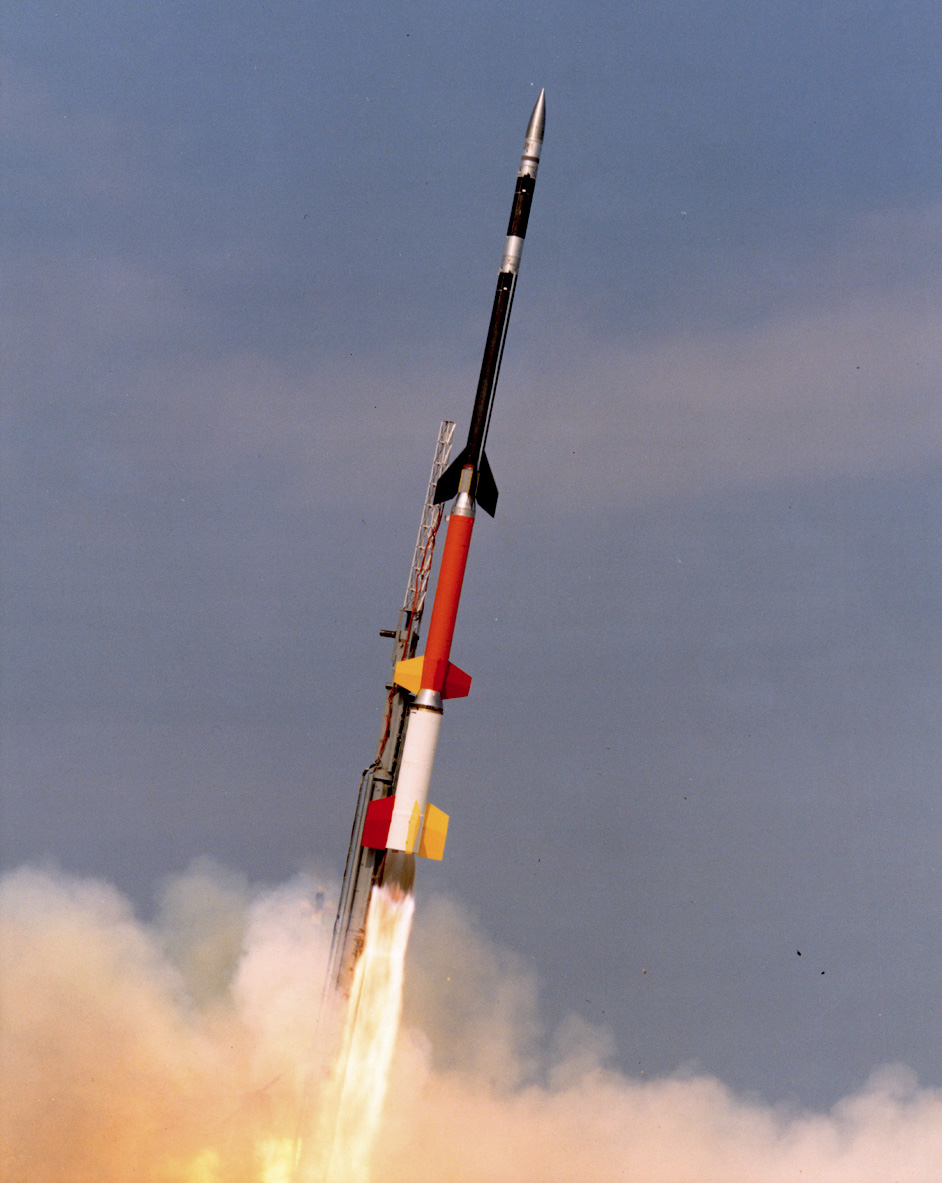|
Mohr Rocket
The Mohr Rocket was a sounding rocket developed by Ernst Mohr in Wuppertal Wuppertal (; ) is a city in North Rhine-Westphalia, in western Germany, with a population of 355,000. Wuppertal is the seventh-largest city in North Rhine-Westphalia and List of cities in Germany by population, 17th-largest in Germany. It ..., Germany. It was a single stage solid fuel rocket with: *a length of 1.7 metres, *a total mass of 150 kg (75 kg propellant), *a lift-off thrust of 76.5 kN and a diameter of 0.3 m. *a payload, which could weigh up to 5 kg (this was stored in a dart with a mass of 15 kg, a maximum diameter of 5.6 centimetres and a length of 1.25 metres.) The burn time of the engine was 2 seconds. After the burnout of the engine the dart was separated from the rocket. Dart and rocket had a altitude of 1200 m and a speed of 1200 m/s when separated after burnout. The dart flew without further propulsion up to a height of 50 kilometres, because ... [...More Info...] [...Related Items...] OR: [Wikipedia] [Google] [Baidu] |
Sounding Rocket
A sounding rocket or rocketsonde, sometimes called a research rocket or a suborbital rocket, is an instrument-carrying rocket designed to take measurements and perform scientific experiments during its sub-orbital flight. The rockets are often used to launch instruments from above the surface of the Earth, the altitude generally between weather balloons and satellites; the maximum altitude for balloons is about and the minimum for satellites is approximately . Due to their suborbital flight profile, sounding rockets are often much simpler than their counterparts built for orbital flight. Certain sounding rockets have an apogee between , such as the Black Brant X and XII, which is the maximum apogee of their class. For certain purposes, sounding rockets may be flown to altitudes as high as to allow observing times of around 40 minutes to provide geophysical observations of the magnetosphere, ionosphere, thermosphere, and mesosphere. Etymology The origin of the term comes fr ... [...More Info...] [...Related Items...] OR: [Wikipedia] [Google] [Baidu] |
Ernst Mohr
Ernst Mohr was a professor of mechanical engineering at the University of Wuppertal. He developed the meteorological Mohr Rocket The Mohr Rocket was a sounding rocket developed by Ernst Mohr in Wuppertal Wuppertal (; ) is a city in North Rhine-Westphalia, in western Germany, with a population of 355,000. Wuppertal is the seventh-largest city in North Rhine-Wes ..., on behalf of the German Rocket Society. The rocket was first launched successfully on September 14, 1958 near Cuxhaven. At the first successful test the rocket reached heights of 50 kilometers and could send out its payload at speeds of 1.2 km per second. External links Encyclopedia Astronautica German mechanical engineers Academic staff of the University of Wuppertal Engineers from North Rhine-Westphalia {{Germany-engineer-stub ... [...More Info...] [...Related Items...] OR: [Wikipedia] [Google] [Baidu] |
Wuppertal
Wuppertal (; ) is a city in North Rhine-Westphalia, in western Germany, with a population of 355,000. Wuppertal is the seventh-largest city in North Rhine-Westphalia and List of cities in Germany by population, 17th-largest in Germany. It was founded in 1929 by the merger of Elberfeld, Barmen, Ronsdorf, Cronenberg, Wuppertal, Cronenberg and Vohwinkel Schwebebahn, Vohwinkel, and was initially called "Barmen-Elberfeld" before adopting its present name in 1930. It is the capital and largest city of the Bergisches Land. The city straddles the densely populated banks of the River Wupper, a tributary of the Rhine. Wuppertal is located between the Ruhr (Essen) to the north, Düsseldorf to the west, and Cologne to the southwest, and over time has grown together with Solingen, Remscheid and Hagen. The stretching of the city in a long band along the narrow Wupper Valley leads to a spatial impression of Wuppertal being larger than it actually is. The city is known for its steep slope ... [...More Info...] [...Related Items...] OR: [Wikipedia] [Google] [Baidu] |
Dart (rocket)
A dart is the free flying final stage of a sounding rocket, and contains the payload. Its form is very aerodynamically designed. After the launch stage burned out the dart is detached and continues to rise only with its own inertia. Some sounding rockets are available both with or without dart. The version without a dart is able to transport more payload, but reaches lesser height. Applications *Mohr Rocket * MMR06 * Hopi Dart * Loki-Dart *Meteor A meteor, known colloquially as a shooting star, is a glowing streak of a small body (usually meteoroid) going through Earth's atmosphere, after being heated to incandescence by collisions with air molecules in the upper atmosphere, creating a ... * Mesquito References Meteorological instrumentation and equipment {{Rocket-stub ... [...More Info...] [...Related Items...] OR: [Wikipedia] [Google] [Baidu] |
Rocket Experiments In The Area Of Cuxhaven
Between 1933 and 1964 numerous rocket experiments were carried out in the area of Cuxhaven, Germany. 1930s and 1940s *In April 1933 Gerhard Zucker launched a mail rocket, which was to fly from Duhnen to the island of Neuwerk, but which fell to Earth after flying a few meters. *During World War II some test flights of Fi-103 (V1) rockets were flown from the military camp of Altenwalde. In 1945, Kurt Debus was ordered to install a launch pad for testing A4-rockets in the area of Cuxhaven, as a replacement for Stand VII in Peenemünde; however, the project could not be completed due to the military situation towards the end of the war. Nevertheless, in October 1945, these works supplied a basis for " Operation Backfire", a demonstration of three A4-rocket launches to military representatives of the Allied Occupation Forces. One launch pad and two concrete shelters were built for "Operation Backfire", near the road between Arensch and Sahlenburg, where some remnants still exist ... [...More Info...] [...Related Items...] OR: [Wikipedia] [Google] [Baidu] |

